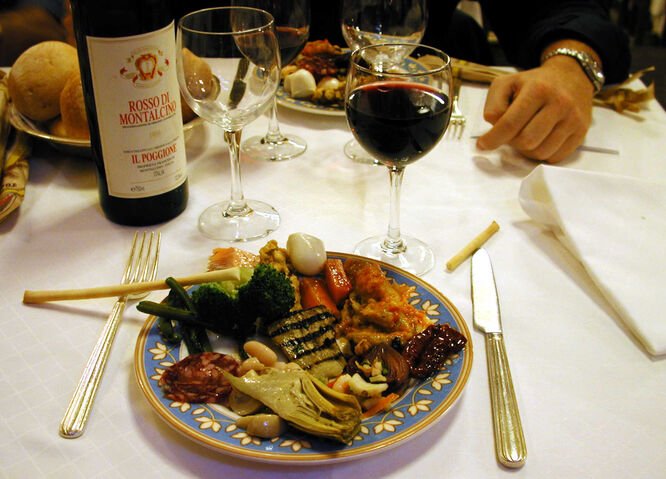A Matter of Taste: Europeans on American Food
By Rick Steves
People always tell me how lucky I am to be eating my way through Europe. But my appreciation of good food was slow in coming. On my first trip to Europe sans parents, I packed along a big plastic tube filled with a swirl of peanut butter and strawberry jam. Every meal I spread it on bread and washed it down with soda pop.
I'm still on the go in Europe, but I eat much better now. During my guidebook research, I get into a rhythm in the last three hours of my long day — blitzing the restaurants on my list, and then returning to my favorite place at the very end of the evening. I often sit down and let the chef/owner cook me up whatever he wants me to experience. These chefs seem to thoroughly enjoy taking off their apron, washing up, and sitting down to share a glass of wine with their last customer of the day — that's me — eating their favorite dishes.
We usually talk about food, and the conversation sometimes shifts to what I eat back home. It can come as a surprise, but Europeans don't always have a dim view of American cooking. After all, McDonald's is the number one fast-food chain in Europe — the one on the Champs-Elysées is the most profitable in the world.
Over one long Italian meal, Claudia (a Roman tour guide) says she loves American food. Her favorites include the BLT sandwich and "chili soup." She's charmed by our breakfast culture and that we "meet for breakfast." She says you would never see families going out for breakfast in Italy.
But she notes that in the US, size matters more than quality. She says that the average number of ingredients in an American restaurant salad or pasta is eight or 10, while in Italy the average salad or pasta has only four or five ingredients. And she can't understand our heavily flavored salad dressings. "If your lettuce and tomato are good, why cover it up with a heavy dressing? We use only oil and vinegar," she says. When I try to defend the fancy dishes as complex, she says, "Perhaps ‘jumbled' is a better word."
Some of my other Italian friends are less tactful. At dinner with three Tuscan friends — Manfredo, Roberto, and Ilaria — I listen to a sharp critique. "I think American pioneers did not know to make a good salami or prosciutto so they could not preserve their meat properly," Manfredo says. "This is why you have the barbecue sauce: to hide this taste of rotting meat."
"Is there no barbecue sauce in Italy?" I ask.
"No," says Manfredo, "but I like very much to make Buffalo wings. Could you kindly send me a package of Frank's Original Red Hot Cayenne Pepper Sauce when you return home?"

We all laugh, and then Roberto adds, "I think, in America, a restaurant is looking not for what is good food. What is good is what sells. Real lasagna is only this thick," he says, sticking his knife through two steamy inches of lasagna on the plate in front of him. "In the United States they make it twice this thick" — flipping another serving on top — "and they fill it with mozzarella. There is no mozzarella in lasagna!" The others cluck in agreement.
Roberto continues, "If you go to an American restaurant and say the food is bad, you get a coupon for a free meal. More bad food. If you say the food is bad in a restaurant in Italy, you get kicked out. To get free food here, it is vice versa — you say, ‘This is the best beefsteak I've ever eaten.' Chef will then say, ‘You must try the dessert.' You say, ‘Oh no.' He says, ‘Here. Please. Take it for free.'"
"In a real Italian restaurant when you complain, the chef will tell you, ‘I cooked this as a boy the way my grandmother cooked this,'" Manfredo says. "It cannot be wrong."
"In the United States, what is right is what sells." Roberto jumps in. "And the computer tells you what food on the menu makes good business. In America, you eat first with your eyes and second with your mouth."
Raising my glass of wine I offer a toast to Italian food. "To la cucina Italiana."
Manfredo follows that, saying magnanimously, "To bacon and eggs." We all agree that American breakfasts are unbeatable.
"Omelets, hash browns," Roberto reminisces. "On my last visit to New York, I gained four kilos in three weeks."
Raising our glasses, we make another toast. "To American breakfasts."

